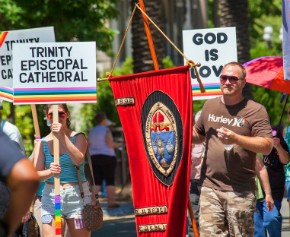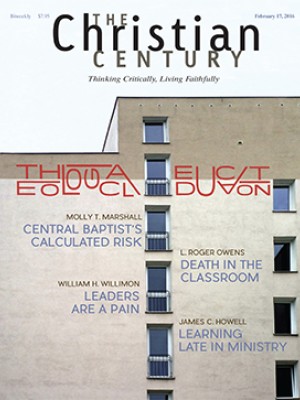Should Episcopalians repent? American liberals in a global communion
The Episcopal Church was and is right to affirm same-sex marriage. Now we should be willing to face the costs.

I was once in the company of an Anglican bishop from Sudan when he was interrupted by an inebriated man who had sought him out for food or money. In responding to the man, the bishop revealed himself to be a masterful and sympathetic pastor—patient, gentle, and firm. Shortly thereafter, our discussion turned to the then-raging Anglican debates over homosexuality and same-sex marriage. “I just don’t understand this whole . . . homosexual thing,” the bishop told me.
I was stunned. This bishop had just shown great pastoral sensitivity, and yet he seemed to speak flippantly about same-sex relations. I gave him the standard arguments, saying that for my own friends who experience same-sex attraction, it isn’t a choice. I said that the members of the Episcopal Church had deeply engaged scripture and tradition in our discernment of this issue and that we viewed affirming same-sex unions as a matter of justice.
Read our latest issue or browse back issues.
Our exchange represented a division that continues to plague the Anglican Communion. That division was made clear again last month when, in response to the Episcopal Church’s decision to allow its clergy to perform same-sex weddings, the Anglican primates—the leaders of the autonomous churches that make up the Communion—voted to reprimand the Episcopal Church and bar its members from certain committees, ecumenical and interfaith dialogues, and decision-making bodies. In my conversation with the Sudanese bishop, I was offended by his resistance to a Western conception of sexuality. He was bewildered by my position, in part because most indigenous African cultures have had different ways of conceptualizing same-sex attraction.
I believe that the Episcopal Church was and is right to welcome monogamous same-sex relationships into its conception of marriage. However, I also think Episcopalians should accept the sanctions of the wider Anglican Communion as a form of repentance. To many of my African friends, including those supportive of LGBT inclusion, the idea that we could stand up for what we thought was right and not face some sort of cost showed typical white liberal presumption. It was naive—and inadvertently neocolonial—to expect that we could both accept same-sex relationships in our church and retain status as equal members of the Anglican Communion. The Episcopal Church took a prophetic stand; we should be willing to face the costs.
Why should the Episcopal Church be disciplined for doing what is right? In what way is repentance involved?
There are at least three ways in which our actions as liberal Episcopalians warrant repentance. First, Episcopalians assumed that our own categories for comprehending same-sex attraction would easily make sense in other cultures. We assumed that the term homosexuality—a term that only emerged in Western languages in the late 1800s and posits a thorough link between sexuality and individual identity—could be easily translated in more communitarian cultures outside the modern West. This assumption inadvertently echoed the Western presumption that colonies had to learn Western languages and customs in order to participate in the global economy.
Same-sex attraction has been conceived quite differently in indigenous cultures of the Global South, which have had their own ways of incorporating such behavior. To take one example: the Nuer of South Sudan and Ethiopia have incorporated same-sex behavior by exercising a flexible understanding of gender. A Western anthropologist in the 1970s became quite confused when he discovered—after often being told there was no homosexuality among the Nuer—the case of a man who had married another man, “This was different,” his primary informant told him, “because the man had actually become a woman; the prophet of Deng had been consulted and had agreed to his change of status. . . . From that time onward it was agreed that ‘he’ should be called ‘she,’ and ‘she’ was allowed to marry a husband.” In other indigenous African cultures, those who experience same-sex attraction were given revered spiritual status, often playing the socially vital role of channeling communication from ancestors. With the advent of Christianity, such activities were generally considered pagan by Western missionaries and early African converts.
Second, many of the Episcopal Church’s official statements on homosexuality have carried an aloof tone and transmitted a “white gaze” (to use the term of social critic George Yancy and theologian J. Kameron Carter). The white gaze is one that assumes a position of objectivity and the right to define a situation. Carefully crafted church statements ended up sounding didactic and clinical to many in the Global South. Ironically, for all the care that Episcopalians put into these statements, the aloofness of the rhetoric echoed the tone of Westerners calmly responding to complaints about imperialisms of the past. Those in the Global South have become accustomed to Westerners responding to cries of neocolonialism with a detached tone that communicates objectivity. But those who have known oppression and who cry out about imperialism seek to be heard, not offered analysis.
Third, we failed to see that the church has been one place where many Africans and others in the Global South feel equal with Westerners on the global stage. Given the massive inequalities of globalization, this sense of equality in the church is of vital importance. Economic regulations imposed by the International Monetary Fund and World Bank remind Africans that they are not equals when it comes to decision making about the global economy. The same holds in international state politics. American embassies in East Africa are some of the largest and best-defended buildings in the region. The symbolism is powerful: even on Kenyan soil, Americans are better protected than Kenyans. Amid these inequalities, many Africans thought the church was the one global body in which they had equal voice.
Yet when conflict arose in the Communion, Americans too rarely treated Africans as equals. Many Episcopalians and Western Christians spoke with a sense of Western moral and cultural superiority—not only at the height of the Anglican crisis a decade ago, but also after the recent primates meeting. Religion writer Jonathan Merritt expressed indignation at the primates’ decision, saying, “Africa is a continent that is regressive, even oppressive, in its treatment of LGBT persons.” Merritt is rightly upset that many Anglican bishops have supported repressive legislation against homosexuality in their home countries. Yet in painting all of Africa as homophobic, such a statement fails to acknowledge the African bishops and other Anglicans who support same-sex relations—often at far greater cost than Americans experience. And it leaves African LGBT Anglicans feeling all the more alone.
What does global mission look like amid this spirituality of repentance for the Episcopal Church? It means engaging in the life of the Communion in culturally attentive ways.
Surely the most important example of this was the reformatting of the Anglican Lambeth Conference in 2008. Archbishop Rowan Williams and the organizing committee based the conference on the reconciliation process used among the Zulu and Xhosa of southern Africa called an indaba, which aims to give every participant a voice through focused deliberation in small consultation groups. Lambeth 2008 did not aim to finalize conversation on sexuality or any other issue, but simply to keep conversations going. Many predicted that the Anglican Communion would dissolve at Lambeth, but no such thing happened. This reconciling process has continued in other reconciling efforts like the Continuing Indaba project and the Consultation of Anglican Bishops in Dialogue.
At a local level, more parishes and dioceses than ever in the Episcopal Church have formed some kind of relationship with other provinces in the Anglican Communion. These companion relationships aim at long-term partnerships that form friendships across borders, even amid wider disagreements in the Communion. My own parish has a relationship with the Diocese of Renk in South Sudan that goes back nearly 20 years and has endured the ups and downs of Anglican crises. Their bishop visits us annually, and we take trips to see them; together we have built elementary schools and supported a theological college. The Episcopal Church has more requests for such companion relationships from overseas dioceses than it can fill. The desire in this country for relationships overseas is great as well.
Relationships like these lead to sensitive cross-cultural interactions that avoid the white gaze. When Bishop Shannon Johnston shared his decision to begin the process of blessing same-sex unions in the Diocese of Virginia in 2011, he explained the decision to global mission partners by sharing a personal, vulnerable experience from his own prayer life—a moment when it became clear that he should move forward with same-sex blessings. Rather than arguing the rightness of his case, he spoke about a deeply personal experience. Even though many partners overseas disagreed with his decision, they sympathized with his prayerful decision-making process.
The common language of prayer provided a bridge for respecting one another amid differences. In fact, more than one mission companion told Johnston that even though they disagreed with the decision, they would have done the same thing were they in his position. That is, they also would have responded to prayer as they understood it. Others said that their shared commitment to prayer was more important than what each of them perceived to hear in such prayer.
Others have sought to thoroughly engage with Anglicans in the Global South who experience same-sex attraction, not only to give them space to voice their experiences but also to learn from non-Western experiences of same-sex attraction. The Chicago Consultation, a U.S.-based group advocating for full inclusion of LGBT persons in the Episcopal Church and the Anglican Communion, now centers its work in sub-Saharan Africa. It works with African clergy, theologians, and laypeople to build networks and explore scripture together, having hosted consultations in South Africa, Kenya, and Ghana. Conversations like these provide African LGBT persons and allies space for mutual support and solidarity and give Westerners opportunities to learn from Africans’ own experiences of same-sex attraction.
Ultimately, the Anglican Communion is about relationships. The institutions of the Communion like the meeting of the primates certainly matter; they provide structure and form to the body that is our common life as Anglicans. But the heart of the Communion surely lies in these interpersonal relationships. This relational grounding of the Communion is both hopeful and perilous: hopeful because the more we engage with the Communion, the more likely we will continue to walk together; perilous because Americans cannot enter these relationships with a mind-set of privilege. Recent sanctions are an opportunity not simply to respond in anger but to find new ways of building Anglican friendships across borders.
Portions of this article first appeared in “Tragedies of Communion: Seeking Reconciliation amid Colonial Legacies” in the Anglican Theological Review (Summer 2015).






